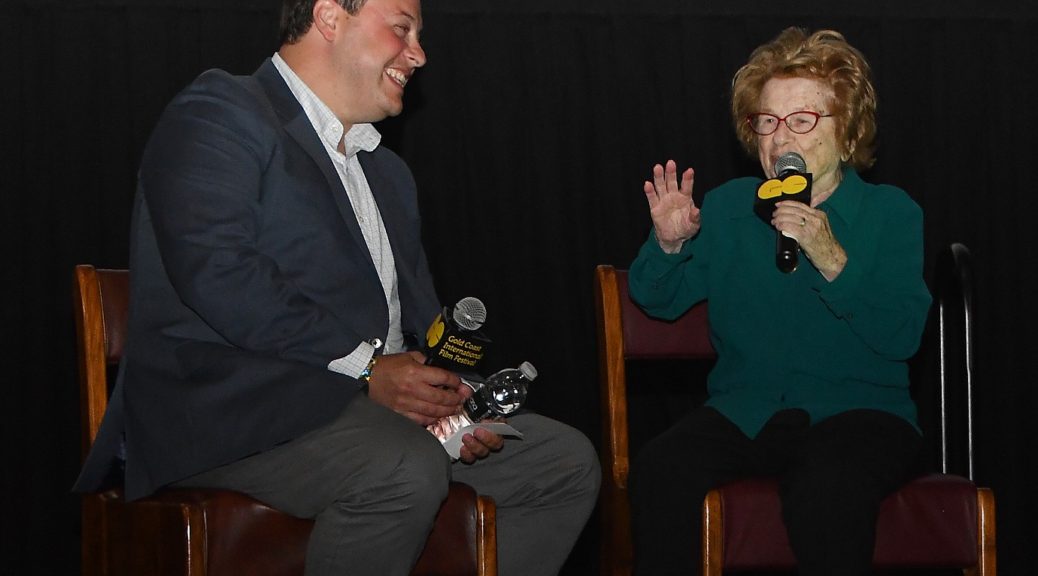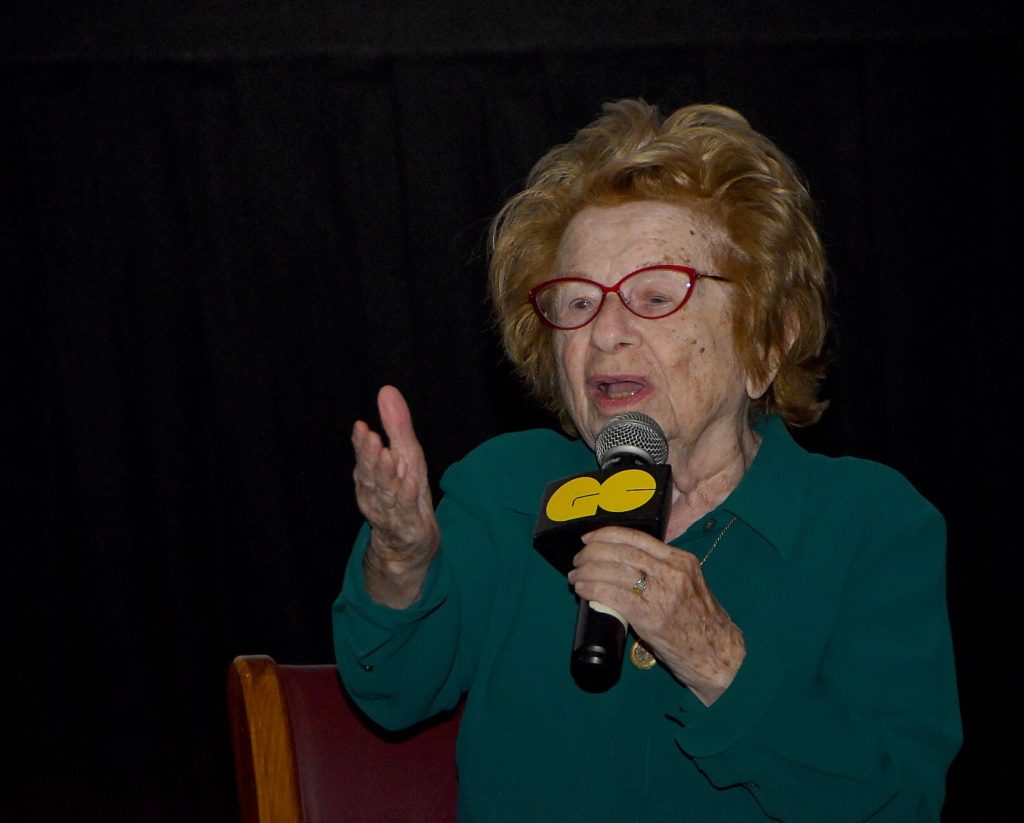
by Karen Rubin, Travel Features Syndicate, goingplacesfarandnear.com
Dr. Ruth Westheimer, the famous sex therapist, claims to have a rule against commenting on politics “someone who talks about sex as much as I do can’t tackle politics.” And yet, positions on sexual freedom, AIDs, abortion rights and reproductive freedom, and more recently, drawing upon painful memories as a Holocaust survivor, on the rise of anti-Semitism and how migrant children are being snatched from their families at the southern border.
She claims not to be a feminist, but when her granddaughter prods her on her views on abortion, on equal pay, on whether men and women should be equal in their relationship, and insists she is the text-book definition of a feminist, Dr. Ruth relents and says she is a feminist supporter, not a radical (she doesn’t hold with burning bras).
She also stood stalwartly for same-sex relationships and was an early advocate for research into prevention and cure of AIDs. She has consistently championed a philosophy of respect for individuals, that there is no such thing as “normal,” but that two consenting adults should do what brings both joy and satisfaction.
She claims to have a rule against commenting on politics “someone who talks about sex as much as I do can’t tackle politics.” And yet, positions on sexual freedom, AIDs, abortion and now, anti-Semitism, invariably bring her into that realm.
She has come to the Gold Coast Arts Center in Great Neck, Long Island, on May 8, for the screening of a documentary about her life, “Ask Dr. Ruth.” The connection to these issues is Michael Glickman, a former president of the Arts Center and President & CEO, the Museum of Jewish Heritage (New York’s Holocaust Museum), where Dr. Ruth is also a trustee, and presently has an important exhibit, “Auschwitz: Not long ago. Not far away” which opened May 8.
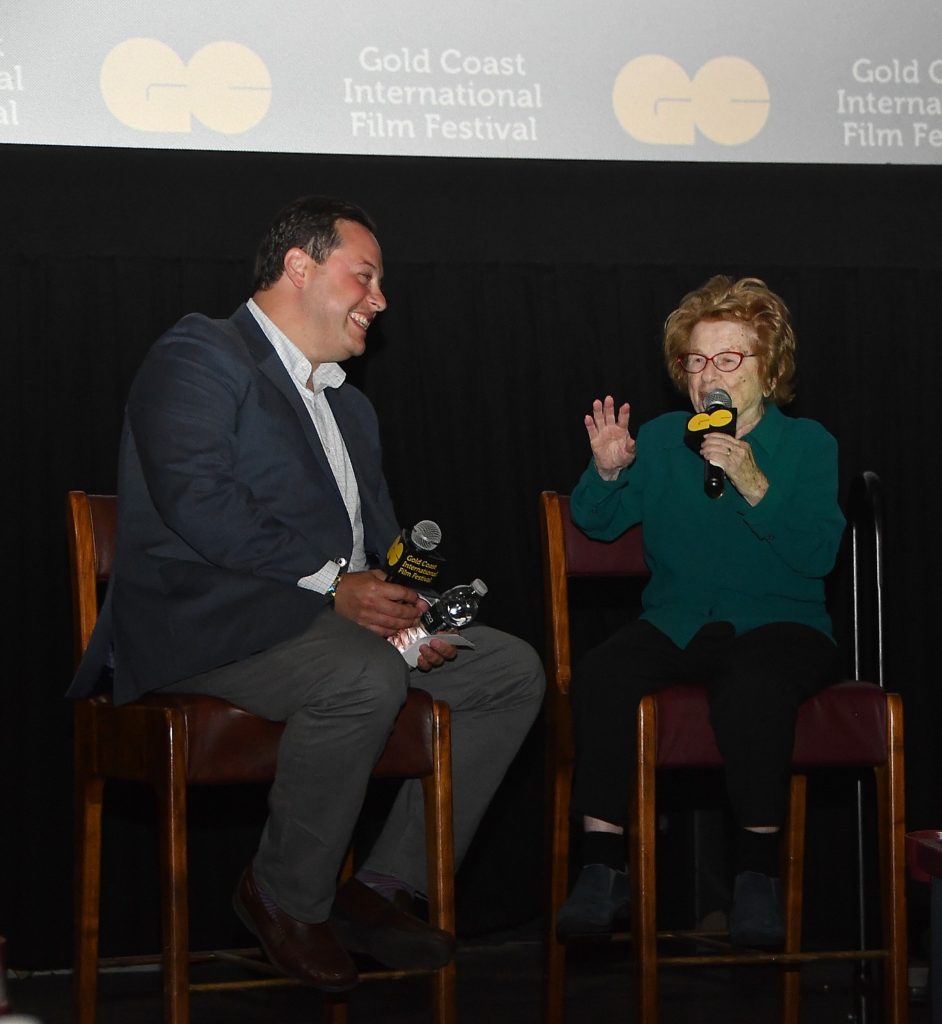
The documentary of her life focuses considerable attention on the Holocaust and how it shaped her life – beginning as a 10 year old, packed up on a train with other Orthodox Jewish children to Switzerland, forced to leave her mother and grandmother at a train station in Frankfurt (her father had already been taken by Nazis to a labor camp). She never saw her family again, but describes how she felt in those years living at an orphanage.
Her son and daughter say how she never really discussed her experience in the Holocaust nor fully mourned the loss of her family, but we see – through old photos and animation and diary entries – what she experienced. And it was only relatively recently that she brought herself to Yad VaShem in Israel to search the database to find out what happened to her parents. In the movie, she realizes that something is wrong when letters stop coming from her parents, and after years go by, she accepts that she is an orphan. She learns that her father was murdered in 1942 in Auschwitz, and her mother was simply “disappeared.”
But what we see throughout is an unbelievably positive, optimistic personality who was able to get the other children on that train to sing away their fear.
Dr. Ruth, as she delights in being known (the first tv/radio host to be known just by the first name), is turning 91 years old now, and on her 90th birthday, she reflected how 80 years before, she was on that train bravely waving goodbye to her family (her parents gave her life twice – the second time when they sent her away); 70 years before, she nearly lost her legs when a bomb went off in Israel, where she was a sniper in the Haganah.
While in the orphanage in Switzerland, the girls were being trained to become housemaids and weren’t allowed to attend high school, but her father always prized education. Her first boyfriend would sneak into her room at night with his textbooks, and hide under her bed while she read that day’s lessons.
After the war, she emigrated to Israel (Palestine) with some friends, changing her name from Karola, which sounded too German, to her middle name, Ruth (and hoping that her family, if they were still alive, could find her).
She’s been married three times – the first time to a very good-looking Israeli soldier; who took her to Paris with him when he attended medical school, affording the opportunity for her to study psychology at the Sorbonne; they divorced when he decided not to become a doctor and to return to Israel and she stayed to finish her studies.
In 1956, with $1,500 in restitution from the West German government, she and her boyfriend sailed to New York, traveling fourth class on the Liberty but sneaking up to first class in order to be able to view the Statue of Liberty as the ship came into New York harbor. They married after she got pregnant, but the marriage didn’t last.
She was a single parent and a working mother when that was still a rarity and an oddity. “We were very poor. There were no other single mothers…“I was on the forefront.” (One of my favorite parts of the movie was the clip of her talking with Gloria Steinem.)
She worked for Planned Parenthood in Harlem, where she found herself participating in frank discussions about sex. By 1967, she was project director. She worked towards her doctorate in family and sex counseling at Columbia University, working with Helen Singer Kaplan, a pioneer in the field of sex therapy.
On a ski trip in the Catskills, she met the love of her life, Fred Westheimer who was the head of the Jewish Ski Club, 35 years old, an engineer and never married. From the first time she saw him, she was determined they would marry. They were married for more than 40 years before he died, in 1997, after a heart attack.
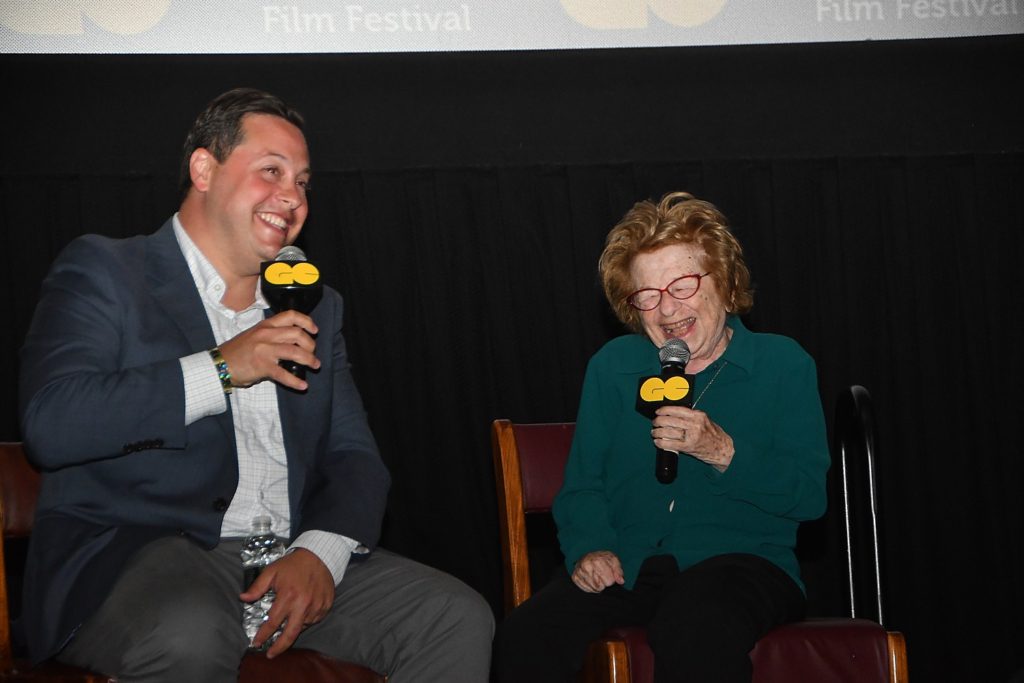
Dr. Ruth, a 4 foot 7 inch tall woman famous for saying “Size doesn’t matter,” got her doctorate at the age of 42 and set up practice as a sex therapist.
A lecture she delivered in 1980 came to the attention of Betty Elam, community affairs manager of the New York radio station WYNY-FM, who offered Ruth $25 a week to make Sexually Speaking, a 15-minute show every Sunday that would air shortly after midnight. The show became a hit, expanding to two-hours, and by 1984 was nationally syndicated.
Her influence as the “Goddess of Good Sex,” as one called her, expanded with a syndicated newspaper column, television shows, appearances in movies and even commercials and a website.
She continues to live in the same Washington Heights apartment she has lived in for more than 54 years, saying that she feels comfortable among other immigrants.
The movie is expertly done – telling the story of a life that is even more dramatic and worthy of a movie than most people, who knew of Dr. Ruth only as someone breaking down barriers of frank talk about sex, realized. Who knew she was a sniper with the Haganah in the early days of Israel, who was caught in a bomb blast and almost lost her legs? Who knew she was married three times (the first two were legalized love affairs, she jokes, the third was the real thing). And who knew of the tragedy she suffered as a Holocaust survivor.
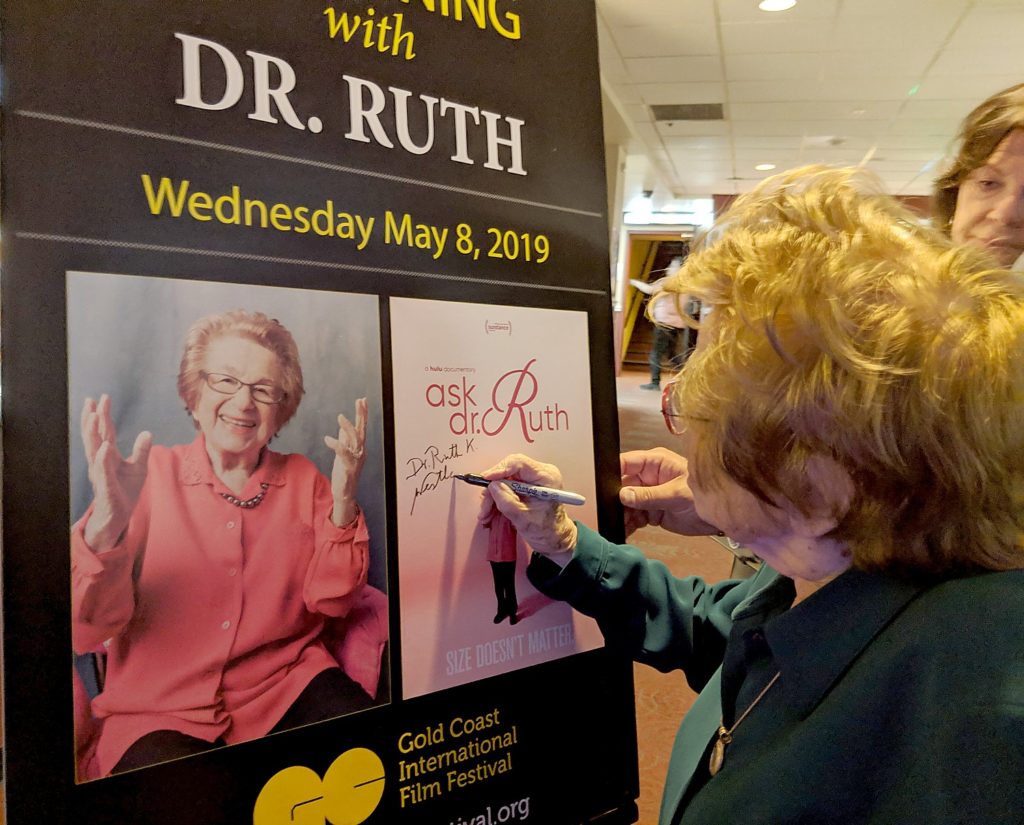
She expresses her absolute surprise (and delight) in becoming a radio, then TV host (“I’m not tall, blonde, gorgeous”), but notes that being an older, mature woman (grandmotherly), she was able to get away with talking explicitly about sex, using such words as vagina, clitoris, masturbation. The fact that the Sexual Revolution (the Pill is 50 years old) was underway, with women beginning to demand their rights and identity, also was a factor. Still, as the film notes, there were censors standing by, protests, even a man who came up on stage where she was speaking to make a citizen’s arrest.
In the film, she revisits people from her childhood – her first boyfriend when she was 13 from the orphanage in Switzerland where she was sent by her mother to escape the Nazis (“My parents gave me life twice, the first time giving birth, the second time sending me away so I could live”); her childhood friend who lives in Israel; her earliest radio producers.
It shows her dogged determination to get an education – something her father, who owned a notions shop, valued so highly. She earned her Masters, then her PhD.
Media regulations at the time required radio stations to do community-oriented broadcasting and a producer appreciated how different Dr. Ruth would be, so put her show, pre-taped on a Thursday, on Sunday at midnight. Her show became more popular than most of the morning drive shows and they put her on live. She notes that she never previewed what questions the callers would be asking, so she could respond spontaneously (on the other hand, on TV, the people posing the questions were actors, though she still did not know what issues they would raise).
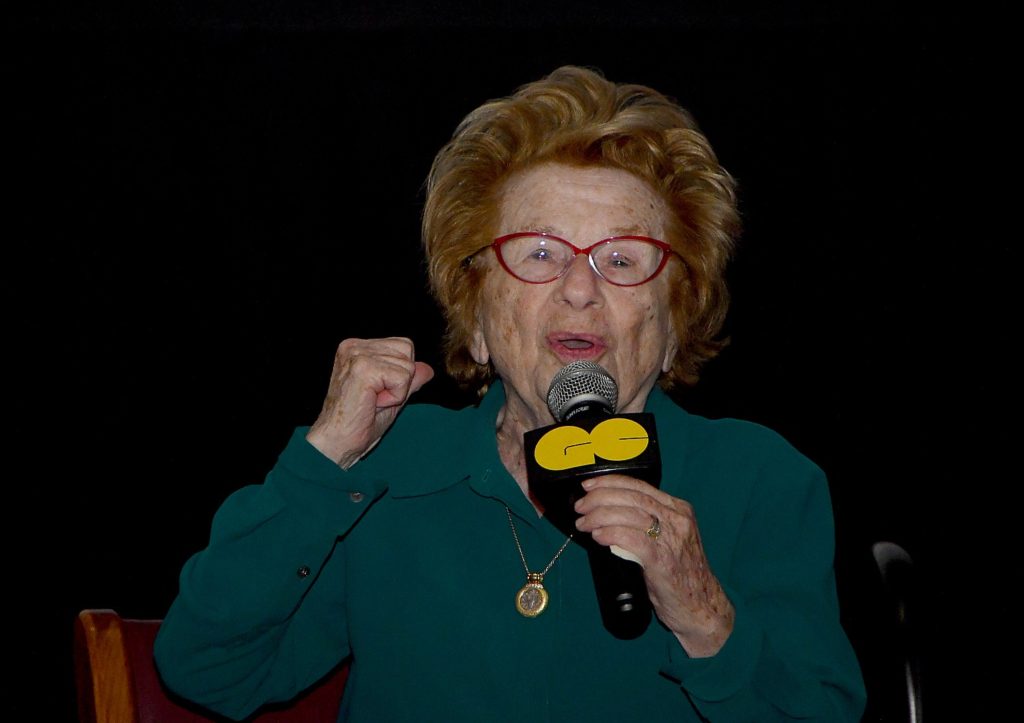
When asked her greatest experience, she replies “My 4 grandchildren… You know, Hitler is dead and I and my grandchildren are alive.”
Asked about her reaction to the movie, she said she had trepidation about the device of using animation to show her early life, but the two Israelis who did the animation “did it brilliantly.”
She reflected on the scene they re-created at the railroad station in 1938, when she was 10 and being sent away by her mother and grandmother. “You know, there were all the other mothers and grandmothers – the fathers had been taken – but they did something brilliant [in suggesting there were only a few on the platform]: you could feel the loneliness of a mother and grandmother saying goodbye, not knowing what would happen, but sending their only child to safety. When I saw this – and I didn’t see it before it was done – I was very happy with the film.”
She jokes, “I promise good sex for anybody who gives this film an [Oscar] nomination.”
She acknowledges that she had not spoken much in the past about being a Holocaust survivor, but that the new exhibit at the Museum of Jewish Heritage, “Auschwitz: Not Long Ago, Not Far Away,” has brought that aspect of her life out. “My work has been about how to educate, to make sure it doesn’t happen again.”
“You have to go twice to the exhibit,” she says. “The first time you will be very upset. Go again to learn something about the history of Nazis coming to power.
“In the front [of the museum] is a cattle car –it is upsetting because I know parents, other grandparents- all of them went on a car like that – very upsetting – that makes me feel like I felt January 5 1939. On the other hand, you have to stand up to be counted, especially these days.
“As you have heard, I don’t do politics, but these days, I have to talk about anti-Semitism, to stand up and say all of us have to fight so this will not happen again.”
Also, “as you have seen in the film clearly, to stand up that abortion must remain legal and family planning needs funding.”
Though she does not “do politics,” she won an Oxford debate defending abortion and family planning. “I’m going again –I probably will be the oldest at age 91.” This time she will be debating pornography.
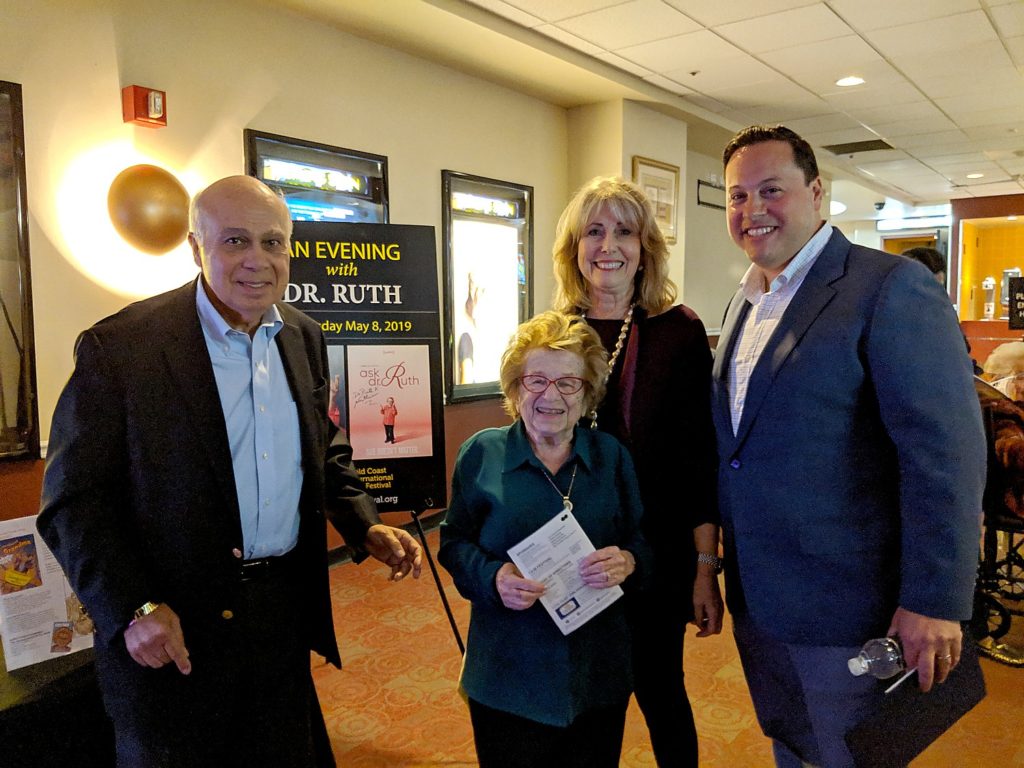
Asked about her opinion of dating apps like Tinder, Dr. Ruth says, “I did not plant that question – but this summer, I have a book coming which warns about apps. It’s not that you shouldn’t use, but you have to use your brains not to meet in a secluded place – to meet in hotel lobby, movie, some place safe.
“Another thing that worries me – in my new book, is that the art of conversation is being lost. Everyone is looking at their phone as if world will crumble if not constantly looking. It’s difficult to have conversation. But the best sexual relationship is also when you have a good relationship.”
In another book that Dr. Ruth is coming out with this year, “Crocodile You’re Beautiful,” she says, “I am telling a little ant to be happy to be an ant – because if you cooperate, you can build bridges.”
Asked if she has been back to Frankfurt, where she was born, she says she goes each year to the Frankfurt book fair, and “every year I am back with a new contract. I also taught a seminar at Heidelberg. I have no problems with people my age or younger – it’s older people I didn’t want to know – like Fiddler. On the other hand, the Adenauer from Germany was instrumental in getting money to Israel when it was just being born. And even today, I go to Israel every year and even today there are young Germans who go for the summer or year to volunteer in old age homes. I appreciate that.”
But, she adds, saying, “Thank you for question – I never came near to that railroad station –it’s too painful – so whenever I had to go some place, I went around not to go to railroad station where I saw my mother and grandmother for the last time.”
She says that for her Masters degree, she did a longitudinal study of 50 children “who came with me to orphanage in Switzerland. I found them all, I went to archives in Switzerland and was in touch with many. They all made it – none of them committed suicide, none became drug addicts or alcoholics. The reason is the early socialization –their early years of childhood. I was 10 ½ – the youngest was 6 – so the early socialization, all had in loving home with parents. That helped them all to overcome becoming orphans. They should do more studies about early socialization, how important early childhood years are.”
She adds, “I do say I am not involved in politics, except these days I have changed my mind – I am very upset when I see children being separated.”
She closes by urging people to visit the “Auschwitz” exhibit at the Museum for Jewish Heritage. “it’s the most remarkable Holocaust exhibition in this country.”
The groundbreaking exhibition, on view through January 3, 2020, brings together more than 700 original objects and 400 photographs from over 20 institutions and museums around the world. “Auschwitz. Not long ago. Not far away” is the most comprehensive exhibition dedicated to the history of Auschwitz – a complex of 48 concentration and extermination camps where 1 million Jews and tens of thousands of others were murdered – and its role in the Holocaust ever presented in North America, and an unparalleled opportunity to confront the singular face of human evil—one that arose not long ago and not far away. (Edmond J. Safra Plaza, 36 Battery Place, New York, NY 10280 https://mjhnyc.org/discover-the-exhibition/about-the-exhibition/)
_____________________________
© 2019 Travel Features Syndicate, a division of Workstyles, Inc. All rights reserved. Visit goingplacesfarandnear.com, www.huffingtonpost.com/author/karen-rubin, and travelwritersmagazine.com/TravelFeaturesSyndicate/. Blogging at goingplacesnearandfar.wordpress.com and moralcompasstravel.info. Send comments or questions to [email protected]. Tweet @TravelFeatures. ‘Like’ us at facebook.com/NewsPhotoFeatures
